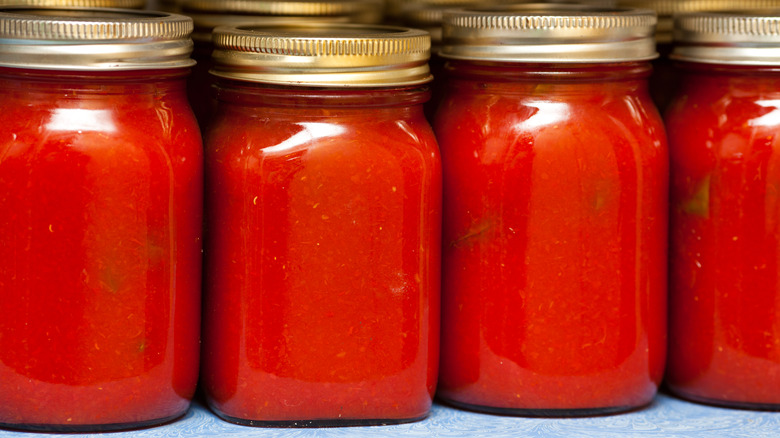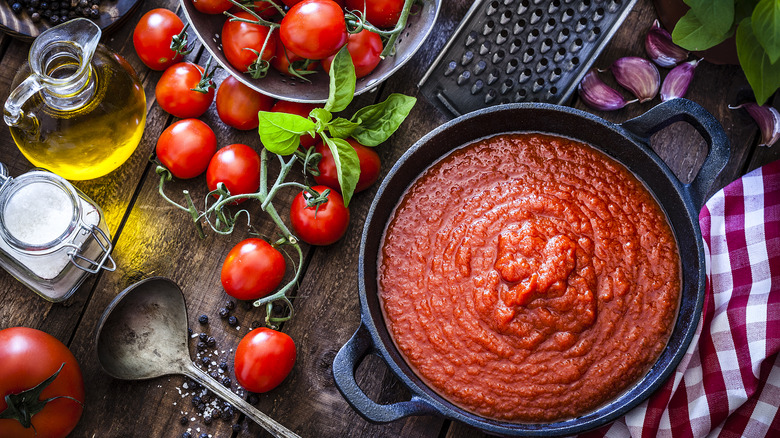How Long Marinara Sauce Will Stay Fresh In The Fridge
Although it may not be how Nonna did it, store-bought pasta sauce is an indispensable pantry staple that even professional chefs embrace. The Barefoot Contessa, Ina Garten, has proudly confessed to keeping a jar of Rao's marinara sauce on hand for a quick meal. Even Italian-born cooking personality Giada De Laurentiis doctors up her favorite store-bought pasta sauce with a parmesan rind for extra umami flavor. While professional chefs wouldn't argue that it's a good idea to always have some around, marinara sauce doesn't last indefinitely, especially once you open the jar.
According to FoodSafety.gov (a website managed by the U.S. Department of Agriculture), once opened, a jar of marinara sauce can be refrigerated for up to five days in an airtight container. Transfer leftover sauce to a smaller container if necessary to limit its oxygen exposure.
Homemade marinara doesn't have the preservatives that a commercially produced sauce might add to extend its shelf-life. However, it should also be consumed or frozen within about four days. Marinara sauce should be refrigerated below 40 degrees Fahrenheit within two hours of cooking. If you prepared a large batch, avoid adding dairy to the sauce until you consume it. Leftover marinara sauce that smells odd, looks funky, or shows signs of mold should be discarded.
Safely storing marinara sauce
An unopened jar of marinara sauce can stay fresh in the pantry for up to 18 months. Check the jar's use-by date before purchase to ensure it hasn't been sitting on the supermarket shelves for too long. Jars and cans should be pristine and stored at room temperature without dents or swelling. Keep in mind that refrigerating unopened jars will not extend their freshness.
Canned raw tomatoes have a shorter shelf life and maintain their quality and freshness for 9 to 12 months. While proper canning techniques can safely store homemade marinara at room temperature for up to 18 months, most of us rely on the refrigerator or freezer to keep Sunday's sauce fresh. For extended storage, transfer the unused jarred marinara sauce to the freezer in a smaller, airtight container for up to three months.
Homemade tomato sauce can be frozen for up to six months. When ready to use it, allow the container to thaw overnight in the refrigerator rather than on the countertop. To be safe, reheat marinara to 165 degrees Fahrenheit, bringing it to a rolling boil to kill foodborne bacteria before adding it to your favorite dishes.
What to do with leftover marinara sauce
Along with topping a bowl of penne and layering lasagna noodles, jarred marinara sauce can be used in many recipes to cut down on prep time. Reheat the leftover sauce for snacks and appetizers like fried ravioli. Serve a platter of the crispy pasta family-style with a tomato dipping sauce and watch them disappear. For an afterschool snack or quick lunch, try a "pizzadilla," an Italian version of a quesadilla made with shredded mozzarella. Cut the pizzadilla into triangles and enjoy dipping it into warm marinara for a deconstructed pizza.
Strombolis and calzones require less sauce than other dishes, making them great recipes when left with just a cup of marinara. Use store-bought pizza dough to make it even easier, and customize them with your favorite toppings, like pepperoni or diced veggies. A spoonful of leftover marinara can transform last night's chicken Milanese into chicken parmesan sandwiches. Or, defrost some meatballs and layer on the sauce and cheese. Brown ground beef and sausage to make an Italian Sloppy Joe, using enough sauce to moisten the meat without turning it into a soupy five-napkin mess.



